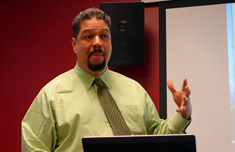-
Roger-Mark De Souza on Illuminating the Connections Between Population Dynamics, Resilience, Conflict
November 22, 2013 By Donald Borenstein
“When you look at the resiliency literature, there’s very often discussion around population and population dynamics, but no one ever knows what to do with it,” says ECSP Director Roger-Mark De Souza in this week’s podcast.
“When you look at the resiliency literature, there’s very often discussion around population and population dynamics, but no one ever knows what to do with it,” says ECSP Director Roger-Mark De Souza in this week’s podcast.
Speaking to a graduate class at George Washington University’s Columbian College of Arts and Sciences, De Souza discusses the role the Wilson Center plays in talking about population and its connections to health, development, the environment, and security.
“We work a lot on reproductive health, maternal health, and urbanization, because we see these as critical interventions that lead to global transformations and provide a really good investment opportunity,” says De Souza. “There are some specific interactions we look at – food, energy, and water – when those issues come together what does that mean? How does that lead to conflict? …How does that build resilience?”
For example, De Souza notes that in research conducted during his time at Population Action International they found 80 percent of all new civil conflicts from 1970 to 2007 occurred in countries with youthful age structures (60 percent of the population under the age of 30). “It’s not necessarily causality, but there’s some relationship here,” he says. Meeting unmet demand for family planning in these countries could therefore help indirectly reduce the potential for conflict.
Likewise, when it comes to climate change, De Souza suggests demographic data can help identify the most vulnerable areas. “Many of the climate change adaptation folks that we work with don’t think about population in a very sophisticated or nuanced way, and [so we’re] bringing that into the policy debates, and making sure there’s recognition of that element.”
De Souza highlights a specific population, health, and environment (PHE) approach – where development interventions target both environmental and reproductive goals – as a powerful way to improve community resilience. “There’s a lot of shared components in terms of qualities, ownership and control of assets, and capacities,” he says. PHE programs are often very tailored to the needs of specific communities, which is a similar process to building resilience to climate change.
But if policymakers don’t know about PHE programs or the other ways in which population dynamics interact with the environment , development, or security, the knowledge is wasted. De Souza points to efforts such as ECSP’s documentary film, Healthy People, Health Environment, as an example of trying to convey success stories in an easily digestible way and encourage more informed global dialogue.
“Everybody’s talking about resilience, societal resilience, social resilience, community resilience, individual resilience, livelihoods,” he says. “What does all this mean? What biases are they coming to this dialogue with, what are they missing, what are some of the key components? This is what I’m trying to get a better handle on, and understand, and figure out how this PHE approach fits in.”
De Souza spoke at George Washington University on October 25.
Friday podcasts are also available for download on iTunes.
 A Publication of the Stimson Center.
A Publication of the Stimson Center.




